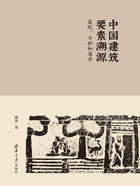
参考文献
[1] FENG J R. Chinese architecture and metaphor: Song culture in the Yingzao Fashi Building Manual [M]. Honolulu: University of Hawai’i Press, 2012.
[2] RYKWERT J. The dancing column: On order in architecture [M]. Cambridge: MIT Press, 1996.
[3]RYKWERT J. On Adam’s House in paradise: The idea of the primitive hut in architectural history [M]. Cambridge: MIT Press, c1981.
[4] 谢晶.建筑的“亭”与“堂”在宋代的社会意义[J].中国研究,2013(16):50-66.
[5]XIE J. Chinese urbanism: Urban form and life in the Tang-Song dynasties [M]. Singapore: World Scientific, 2020.
[6] XIE J. Transcending the limitations of physical form: A case study of Cang Lang Pavilion [J]. The Journal of Architecture, 2016, 21(5): 691-718.
[7] SOPER A C. The“Dome of Heaven”in Asia [J]. The Art Bulletin. 1947, 29(4):225-248.
[8] HU J. Embracing the circle: Domical buildings in east Asian architecture ca. 200-750 [D]. Princeton: Princeton University, 2014.
[9] PANKENIER D. Astrology and cosmology in early China: Conforming earth to heaven [M]. New York: Cambridge University Press, 2013.
[10] WANG A H. Cosmology and political culture in early China[M]. Cambridge:Cambridge University Press, 2000.
[11] TSENG L L Y. Picturing heaven in early China[M]. Cambridge: Harvard University Asia Center, 2011.
[12] TUAN Y F. Humanist geography: An individual’s search for meaning[M]. Staunton:George F. Thompson Publishing, L.L.C., 2012: 98.
[13] 于倬云.中国宫殿建筑论文集[M].北京:紫荆城出版社,2002:165-193.
[14]郭华瑜.中国古典建筑形制源流[M].武汉:湖北教育出版社,2015:223-238.
[15] 谢晶(景),李梦笔.早期青铜器斗栱之文化含义探讨[J].文物建筑,2019,12:29-38.
[16] KEIGHTLEY D. Religion and the rise of urbanism[J]. Journal of the American Oriental Society, 1973, 93 (4): 532.
[17] 巫鸿.中国古代艺术与建筑中的“纪念碑性”[M].上海:人民出版社,2017:141-191.
[18] AURELIUS M. Meditations[M].南京:译林出版社,2016: 16.
(1)本段文字为作者译。